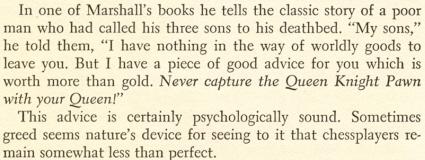
Edward Winter
A number of quotes and anecdotes concern the dangers of capturing the queen’s knight’s pawn, a matter raised by Alan Brooks (Ilford, England). Readers’ assistance in building up a collection of such citations and stories will be appreciated.
(5827)
From page 13 of One Hundred Chess Maxims by C.D. Locock (Leeds, 1930):
‘The queen should usually be kept in the background till a promising attack is established. Avoid using her for hunting distant pawns, such as the QKtP. It takes two moves for the queen to take it and get home again – if she can.’
Frederick S. Rhine (Park Ridge, IL, USA) quotes from page 220 of The Game of Chess by Siegbert Tarrasch (London, 1935):
‘It is very dangerous to make a raid with the queen early on in the game. In particular, the capture of the queen’s knight’s pawn with the queen often brings its own revenge.’
This text appeared on page 312 of the original German edition, Das Schachspiel (Berlin, 1931):
‘Sehr bedenklich ist es, mit ihr im Anfang des Spieles auf Beute auszugehen. Besonders die Eroberung des b-Bauern durch die Dame rächt sich häufig.’
(5865)
Frederick S. Rhine cites Irving Chernev on page 262 of 1000 Best Short Games of Chess (New York, 1955):
‘Alvin Cass used to say, “My grandmother, when she was a little girl, told me never to capture the queen knight pawn with my queen”.’
(6021)
From page 94 of Chess Traps, Pitfalls, and Swindles by I.A. Horowitz and F. Reinfeld (New York, 1954):

(6669)
Information is requested on two items given by Irving Chernev on page 14 of the October 1974 CHESS:
In the latter citation, ‘castle’, instead of ‘capture’, is sometimes seen.
(6829)
We commented in C.N. 8455 that the entire field of chess proverbs is murky. Regarding Tartakower and the word ‘philosophize’, see C.N. 9185.
Page 54 of the May-June 1937 American Chess Bulletin quoted an item from the South African Chess Magazine:
‘It is said a wealthy chess enthusiast left his son £1,000 a year on condition the lad never took the QKt pawn. The game (Botvinnik v Spielmann) once more serves to show how extremely wise the old gentleman was.’
On page 31 of the February 1970 BCM, in a report on Hastings 1969-70, Harry Golombek wrote with reference to Drimer v Portisch:
‘At move 17 he had to choose between taking Portisch’s queen’s pawn or queen’s knight’s pawn. The first capture would have left him a long, though uphill, fight, but the story of the Austrian nobleman who left his son a fortune provided that he never played QxQKtP has never penetrated the borders of Romania. Drimer took the queen’s knight’s pawn and found that two moves later he had either to lose his queen for a rook or be mated.’
(8289)
From page 7 of Modern Master-Play by F.D. Yates and W. Winter (London, 1929):
‘A story is told of a chess enthusiast of the middle of the last century who willed his son £1,000 per annum on condition that he never took the QKtP ...’
(8955)
Extreme scepticism is naturally de rigueur with anything
introduced by ‘It is said ...’ or ‘A story is told ...’
Concerning usage of the term ‘poisoned pawn’ in connection with the move 29...Bxh2, see Section 6 of our feature article Spassky v Fischer, Reykjavik, 1972.
Who introduced the term ‘poisoned pawn’? It appears on page 255 of the second volume of Alekhine’s Best Games (in a note to White’s 15th move in Alekhine’s second match-game against Euwe in 1926), but the earlier German and French texts (in Auf dem Wege zur Weltmeisterschaft and Deux cents parties d’échecs) did not include the notion of poison but merely referred to danger.
(6461)
‘Capturing that queen’s knight’s pawn by the queen is an old temptation. The trouble with resisting temptation ... is that it may never come again.’
D.J. Morgan, BCM, December 1964, page 364.
From page 462 of L’Echiquier, 5 April 1934, in a ‘fins de partie curieuses’ article by Tartakower:

(11052)
To the Chess Notes main page.
To the Archives for other feature articles.
Copyright: Edward Winter. All rights reserved.